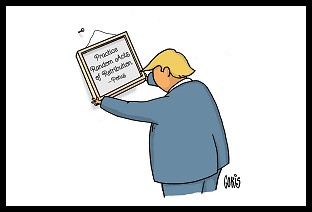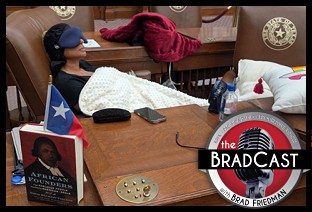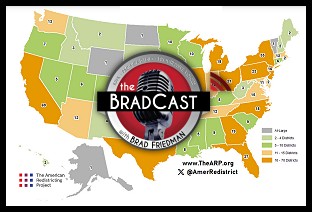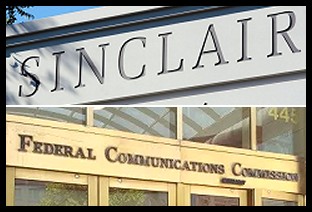 Despite failing to object for months prior, the nation's largest electronic voting system vendor, ES&S, is now attempting to stop a landmark independent examination of their e-voting systems in a Pennsylvania county dead in its tracks.
Despite failing to object for months prior, the nation's largest electronic voting system vendor, ES&S, is now attempting to stop a landmark independent examination of their e-voting systems in a Pennsylvania county dead in its tracks.
An October letter from the company, obtained by The BRAD BLOG, charges that Venango County, PA, is in violation of their contract agreements with the Omaha-based e-voting Goliath, even as two volunteer Carnegie Mellon computer scientists are in the midst of a forensic audit of the county's May 17 primary election. The county's investigation comes on the heels of apparent failures of the ES&S iVotronic touch-screen voting system during their recent primary and several other recent elections in Venango.
The 100% unverifiable ES&S iVotronic system has failed in a number of elections nationwide, but is still widely used across the country and slated for use once again in more than a dozen states in next year's Presidential election.
The Venango study, which we first reported on in early October as it began, came about after worries arose during a 2008 election when the ES&S system reported that some county candidates "had zero votes," as the county's Republican Board of Elections chair, Craig Adams, recently told us while we were guest hosting the nationally syndicated Mike Malloy Show.
Confidence in the system flagged once again, more recently, according to VotePA.us founder Marybeth Kuznik, after "numerous reports of vote-flipping, candidates missing from screens, write-ins missing, and high undervote rates" in the Republican-leaning county's May 17 primary.
The county Board of Elections, currently comprising two Republicans and one Democrat, begs to differ with the ES&S claim that the county is in violation of its contractual agreements. The claim is "disingenuous at best," according to a legal memorandum obtained by The BRAD BLOG, from the Board's counsel. We've also obtained and reviewed ES&S' letters to the county and the county's agreement with the two independent computer analysts. The documents appear to back up the Venango attorney's assessment...
In an October 13th, 2011 letter [PDF] to the Board, ES&S charges that "proprietary" software, "necessary to read in, consolidate and report the results of the May 17, 2011 election" was given to the two computers analysts, leading the county to "inadvertently violate...the terms of its Agreement...with ES&S."
If that software is "necessary" for use in examining the results of the election, one wonders on what grounds ES&S could object to independent analysts using it for that express purpose. But more on that in a moment.
The company's letter, written by Associate General Counsel Timothy J. Hallett, goes on to claim that the state's Purchase Order Form and the Voting System Agreement "entered into by ES&S and the County dated March 22, 2006...agreed to certain terms respecting its use of the ES&S Software."
"Specifically," Hallett writes, "the County agreed that it would not cause or permit any use, display, loan, publication, transfer of possession, sublicense or other other dissemination of the ES&S Software or documentation, in whole or in part, to any third party without the prior written consent of ES&S."
The letter goes on to claim that "ES&S did not provide its consent for the ES&S Software to be copied and disseminated to the third party Computer Scientists" and that the county "was not authorized" to provide them with the software.
That, however, appears to be a change in position from a letter sent just weeks earlier, also written by Hallett.
The audit, being carried out by two Carnegie Mellon computer scientists, Greg Kesden and David Eckhardt, has been under way since late September, when the computer hard drives were copied in whole for the analysts to use in carrying out their study. The examination finally began after several "months of legal wrangling," according to Kuznik and Adams, between county officials opposed to the audit and Board of Elections and local Election Integrity advocates troubled by the unexplained anomalies and reports of physical failures in several recent elections.
ES&S, however, had full knowledge that the audit was to begin in late September, following several months of preparation during which the company was kept apprised of the negotiations and other plans.
In a September 22, 2011 letter [PDF], also written by Hallett just days before the audit officially began (and CC'd to top company officials including its CEO Todd Urosevich), the company acknowledged that the county was "free to conduct any such independent audits they deem necessary with respect to ES&S' voting system used by the County."
While noting the county's contractual "obligations with respect to its use of the ES&S proprietary software and ES&S equipment," Hallett nonetheless offered no objections and even stated that [emphasis added] "ES&S is confident that any well defined and independent audit conducted by the County and the Board will conclude that ES&S' voting systems are accurate, secure and reliable."
Hallett's new contention in the October letter, however, that Venango's audit violates third party restrictions on the use of its software, appears to be without merit.
The contracts with computer scientists Kesden and Eckhardt, which the Venango County Board of Election's Special Counsel says ES&S had earlier reviewed, specifies that the analysts are each "acting as an agent of the Election Board of Venango County."
Their role as an "agent of the Election Board" is mentioned twice in each contract.
"Messrs. Eckhardt and Kesden are agents of the principal (the Board of Elections and the County), not third parties," writes Venango's attorney Charles A. Pascal, Jr. in his October 19th Opinion Memorandum [PDF] sent to the Board in response to ES&S' October letter. "As principal, the Board of Elections has explicitly authorized them to act for the principal, using their special expertise in conducting a forensic audit of the election."
"The agents' temporary possession and use of software and election data for purposes specified by the principal is legally tantamount to possession by the principal, the Board of Elections," Pascal argues. "Under the principles of agency law, their actions that are pursuant to actual authority are the actions of the principal."
"Hence, for legal analysis of powers and duties, vis a vis ES&S under the contract, Messrs. Eckardt and Kesden are analyzed as the Board of Elections, not as separate entities and not as third parties."
Pascal's memorandum goes on to note that "ES&S was advised of the plans of the Board of Elections to conduct a forensic audit throughout the summer." He then goes on to detail a number of correspondences between the parties, including Hallett's September 22 letter, which failed to provide any objection to the county's plan.
"It is obvious that ES&S, as a company which deals with computer software, is well aware of what a 'forensic audit' entails, and what the process for such a procedure would be," Pascal writes. "There is no way for any 'forensic audit' to be conducted without first making a forensic copy of that which is to be analyzed."
He goes on to describe the ES&S attempt to derail the examination as "disingenuous at best."
"It is crystal clear that ES&S was fully aware of the plans of the Board of Elections for some time," Pascal says. "Throughout all of this, ES&S did not object to the conduct of a forensic audit by the Board. Therefore, any potentially legitimate objection which ES&S may have had to this process has, in my opinion, been waived."
The landmark examination was arranged by Venango County's pro tem Board of Elections, currently headed by Adams and comprised of two Republicans and one Democrat, given the electorate make-up of the Republican-leaning county. All of the Board's pro tem officials are strong advocates for the audit. Some on the County Board of Commissioners, however, have strongly opposed it.
Usually the Commissioners serve as the election board, but when those officials are up for election, as they are this November, pro tem board members are named by a judge to replace them.
The next election in Venango County will be held --- for the first time on a paper-ballot optical scan system --- on November 8th, while the county's 100% unverifiable ES&S iVotronic touch-screen systems, the ones which failed in the previous elections, are being examined.
The term for the pro tem Election Board will expire no later than December 31st, or earlier if so ordered by a Judge, and then the County Board of Commissioners will once again take control of the county's elections. Adams, as well as other sources The BRAD BLOG has spoken to, believe that ES&S' apparent about-face could well be a stall tactic, aimed at keeping the independent examination from moving forward until the Board of Commissioners retakes the reigns and cancels the contracts with the analysts.
According to their contracts, which The BRAD BLOG has examined, Eckhardt and Kesden, both members of the Libertarian Party, serve at the pleasure of County Election Officials. They are working as pro bono agents of the County, without financial compensation. As each of their contracts states, "The Analyst will be fully compensated by the opportunity to serve the public good."
The ES&S iVotronic touch-screen system has been a notorious failure in state-after-state over recent years, though their systems will once again be in wide use during the 2012 Presidential cycle. In our initial coverage of the Venango audit earlier this month, we detailed a "brief history of systemic ES&S voting system failures" which have occurred in nearly every state they are used, including Pennsylvania, Arkansas, Florida, Kentucky, Iowa, California, Texas, West Virginia, Tennessee, South Carolina, and elsewhere.
Among the more notorious failures of the 100% unverifiable ES&S iVotronic touch-screen system is the still-inexplicable reported "victory" of the unknown Alvin Greene in the 2010 Democratic primary for the U.S. Senate in South Carolina. In a 2006 Special Election to fill the U.S. House seat vacated by former Sec. of State Katherine Harris in Florida's 13th Congressional District, the ES&S iVotronics completely lost some 18,000 votes, as the Republican was declared the "winner" of that election by a 369 vote margin. The machines were subsequently decertified for general use in the Sunshine State.
Earlier this year, eight high-ranking members of the Clay County, KY, Election Commission --- including the County Clerk, a Circuit Court Judge and the County's School Superintendent --- were sentenced to more than 150 years in federal prison after it was discovered they'd conspired to change the votes of voters after they'd been cast on the same type of ES&S iVotronic touch-screen systems that are now being examined in Venango County, PA.
"What was the reason that people were giving for fighting against independently examining these voting systems?" we asked Venango County's Election Board Chairman Craig Adams during our on-air conversation on the Malloy Show earlier this month. [Listen to the full interview here.]
His response was direct, blunt and deliberately slow: "They know there's something wrong."


 Sunday 'Random Acts of' Toons
Sunday 'Random Acts of' Toons From CA's 'Nuclear Deterrence' Map to Newsom's Trolling to Trump's 'Fascist Theatre' and Beyond: 'BradCast' 8/21/25
From CA's 'Nuclear Deterrence' Map to Newsom's Trolling to Trump's 'Fascist Theatre' and Beyond: 'BradCast' 8/21/25 'Green News Report' 8/21/25
'Green News Report' 8/21/25
 On 'Americanism' and Trump's 'Stalinesque' Plot to Whitewash U.S. History: 'BradCast' 8/20/25
On 'Americanism' and Trump's 'Stalinesque' Plot to Whitewash U.S. History: 'BradCast' 8/20/25  Texas GOP Imprisons Dem State Lawmaker in State House Chamber: 'BradCast' 8/19/25
Texas GOP Imprisons Dem State Lawmaker in State House Chamber: 'BradCast' 8/19/25 'Green News Report' 8/19/25
'Green News Report' 8/19/25 Trump, Nazis and
Trump, Nazis and  Sunday '
Sunday ' Newsom's 'Election Rigging Response Act'; FCC's License Renewal for Sock-Puppeting Sinclair: 'BradCast' 8/14/25
Newsom's 'Election Rigging Response Act'; FCC's License Renewal for Sock-Puppeting Sinclair: 'BradCast' 8/14/25 'Green News Report' 8/14/25
'Green News Report' 8/14/25 140 New House Reps?: Moving Beyond the Gerrymandering Wars: 'BradCast' 8/13/25
140 New House Reps?: Moving Beyond the Gerrymandering Wars: 'BradCast' 8/13/25 FCC Renews Sinclair TV Licenses Despite Complaint from Petitioner Who Died Waiting
FCC Renews Sinclair TV Licenses Despite Complaint from Petitioner Who Died Waiting It's Not About the Rule of Law, It's About Authoritarian Control: 'BradCast' 8/12/25
It's Not About the Rule of Law, It's About Authoritarian Control: 'BradCast' 8/12/25 'Green News Report' 8/12/25
'Green News Report' 8/12/25 After Vaccine Cancels, CDC Shooting, Former Officials Want RFK Out: 'BradCast' 8/11/25
After Vaccine Cancels, CDC Shooting, Former Officials Want RFK Out: 'BradCast' 8/11/25 Sunday 'All's Well' Toons
Sunday 'All's Well' Toons 'Green News Report' 8/7/25
'Green News Report' 8/7/25 Trump Wars Against Greem Energy, Democracy on VRA's 60th: 'BradCast' 8/7
Trump Wars Against Greem Energy, Democracy on VRA's 60th: 'BradCast' 8/7 Media Conglomerates Continue Trump Capitulation: 'BradCast' 8/6/25
Media Conglomerates Continue Trump Capitulation: 'BradCast' 8/6/25 Banana Republican: Trump Shoots the Labor Statistics Messenger: 'BradCast' 8/5/25
Banana Republican: Trump Shoots the Labor Statistics Messenger: 'BradCast' 8/5/25 All's Fair in Love, War and, Apparently, Part-isan Gerrymandering: 'BradCast' 8/4/25
All's Fair in Love, War and, Apparently, Part-isan Gerrymandering: 'BradCast' 8/4/25 The Art of the Corrupt, Phony, Unlawful, Pretend Trade Deal: 'BradCast' 7/31/25
The Art of the Corrupt, Phony, Unlawful, Pretend Trade Deal: 'BradCast' 7/31/25 Battle Begins Against Trump EPA Climate Regulations 'Kill Shot': 'BradCast' 7/30/25
Battle Begins Against Trump EPA Climate Regulations 'Kill Shot': 'BradCast' 7/30/25 A Pu Pu Platter of Trump Corruption: 'BradCast' 7/29/25
A Pu Pu Platter of Trump Corruption: 'BradCast' 7/29/25 'Catastrophic' GOP Cuts to Medicaid, Medicare, ACA: 'BradCast' 7/28/25
'Catastrophic' GOP Cuts to Medicaid, Medicare, ACA: 'BradCast' 7/28/25
 VA GOP VOTER REG FRAUDSTER OFF HOOK
VA GOP VOTER REG FRAUDSTER OFF HOOK Criminal GOP Voter Registration Fraud Probe Expanding in VA
Criminal GOP Voter Registration Fraud Probe Expanding in VA DOJ PROBE SOUGHT AFTER VA ARREST
DOJ PROBE SOUGHT AFTER VA ARREST Arrest in VA: GOP Voter Reg Scandal Widens
Arrest in VA: GOP Voter Reg Scandal Widens ALL TOGETHER: ROVE, SPROUL, KOCHS, RNC
ALL TOGETHER: ROVE, SPROUL, KOCHS, RNC LATimes: RNC's 'Fired' Sproul Working for Repubs in 'as Many as 30 States'
LATimes: RNC's 'Fired' Sproul Working for Repubs in 'as Many as 30 States' 'Fired' Sproul Group 'Cloned', Still Working for Republicans in At Least 10 States
'Fired' Sproul Group 'Cloned', Still Working for Republicans in At Least 10 States FINALLY: FOX ON GOP REG FRAUD SCANDAL
FINALLY: FOX ON GOP REG FRAUD SCANDAL COLORADO FOLLOWS FLORIDA WITH GOP CRIMINAL INVESTIGATION
COLORADO FOLLOWS FLORIDA WITH GOP CRIMINAL INVESTIGATION CRIMINAL PROBE LAUNCHED INTO GOP VOTER REGISTRATION FRAUD SCANDAL IN FL
CRIMINAL PROBE LAUNCHED INTO GOP VOTER REGISTRATION FRAUD SCANDAL IN FL Brad Breaks PA Photo ID & GOP Registration Fraud Scandal News on Hartmann TV
Brad Breaks PA Photo ID & GOP Registration Fraud Scandal News on Hartmann TV  CAUGHT ON TAPE: COORDINATED NATIONWIDE GOP VOTER REG SCAM
CAUGHT ON TAPE: COORDINATED NATIONWIDE GOP VOTER REG SCAM CRIMINAL ELECTION FRAUD COMPLAINT FILED AGAINST GOP 'FRAUD' FIRM
CRIMINAL ELECTION FRAUD COMPLAINT FILED AGAINST GOP 'FRAUD' FIRM RICK SCOTT GETS ROLLED IN GOP REGISTRATION FRAUD SCANDAL
RICK SCOTT GETS ROLLED IN GOP REGISTRATION FRAUD SCANDAL VIDEO: Brad Breaks GOP Reg Fraud Scandal on Hartmann TV
VIDEO: Brad Breaks GOP Reg Fraud Scandal on Hartmann TV RNC FIRES NATIONAL VOTER REGISTRATION FIRM FOR FRAUD
RNC FIRES NATIONAL VOTER REGISTRATION FIRM FOR FRAUD EXCLUSIVE: Intvw w/ FL Official Who First Discovered GOP Reg Fraud
EXCLUSIVE: Intvw w/ FL Official Who First Discovered GOP Reg Fraud GOP REGISTRATION FRAUD FOUND IN FL
GOP REGISTRATION FRAUD FOUND IN FL

































